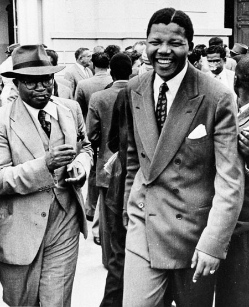 Winners get to write history books. Nelson Mandela was on the right side of history and he also won his struggle. When he died Thursday, he died as a hero to most people.
Winners get to write history books. Nelson Mandela was on the right side of history and he also won his struggle. When he died Thursday, he died as a hero to most people.
I don’t know of a soul who’s all sinner or all saint, but history likes to paint with a broad brush. We don’t like to let people be human and see them as a mixture of good and bad. We want to glorify or vilify them. Current history has passed its verdict on Mandela, though. He’s a saint.
I think Mandela was more complicated than that. He was a leader in the movement to free black South Africans from a government that treated them as little better than slaves. He evolved over time into a sophisticated spokesman for his movement. And he was part of negotiating a deal which changed South Africa without the bloodshed that comes so often with struggles such as this.
But some people claim he was a terrorist and a communist, as his detractors said more than 5o years ago. A British historian claimed last year that he had unearthed evidence confirming Mandela’s membership in the communist party in South Africa. And the Soviet Union was widely believed to supply money and other support to further the rebellion in its early years.
Almost anyone who has led a rebellion has been guilty of atrocities or at least allowing terrible things to be done. The British considered the American revolutionaries to be terrorists, although they had slightly different language two centuries ago. (And some of the American revolutionaries certainly adopted terrorist tactics. Read about the man who history remembers as “the Swamp Fox” sometime.)
Your irregular fighter is a terrorist. Mine is a freedom fighter.
I suspect that Mandela endorsed or tolerated terrible things that were done to fight the white South African government, at least early in the conflict. He went to prison fairly early in the struggle, so he had the ability to evolve his thinking and his leadership from a position where he didn’t have the power to carry out terrorist attacks. (There are indications, though, that his then-wife, Winnie, was quite willing to engage in barbarity.)
My views about Mandela was strongly influenced earlier this year by a Canadian radio show that played bits and pieces of interviews with from over the years. It was from the CBC’s show called Ideas. It’s about an hour, and I strongly recommend it.
Mandela probably started out as an angry young man who was willing to use violence to achieve his goals of overthrowing the oppressive white government. Because the Soviets were his movement’s allies and their ideology was seen as the future of the Third World by many people at the time, it’s natural that he would have at least flirted with membership in a communist party. He might very well have started at those places in his thinking. If he had remained out of prison, it’s possible that he would have led a bloody revolution. We will never know.
But while in prison, he learned not to hate his enemies. He learned not to hate the people who took away his freedom for a large chunk of his life. He became someone who was willing to put aside his natural bitterness about that and negotiate a peaceful settlement that prevented a bloody conclusion to the struggle.
No matter where he started and no matter what he favored or tolerated in the ’50s or early ’60s, any reasonable person has to admire what he became and how he overcome what must have been a strong desire to hate.
I don’t believe that Mandela was a saint. I think he was a complicated human being with strengths and weaknesses. But he was an intelligent and deeply feeling man who saved his country from a tremendous amount of bloodshed. And in doing so, he freed many people from chains, not just himself.
He started his adult like as an angry and bitter young man who wanted to destroy the people who oppressed him and his people. He evolved into someone who helped to free many people — and in a way that avoided reprisals against those who had harmed him.
In my mind, that’s enough to make him a hero. Mostly, though, he was just a complicated man who was on the right side of history.
 Reaction to Penn State scandal shows danger of putting leaders on pedestal
Reaction to Penn State scandal shows danger of putting leaders on pedestal Rights or choices? It might be time to re-frame the debate
Rights or choices? It might be time to re-frame the debate